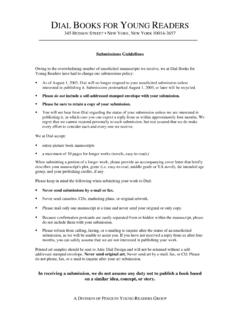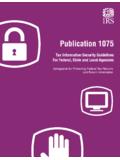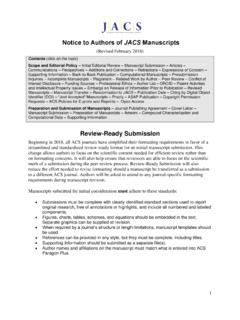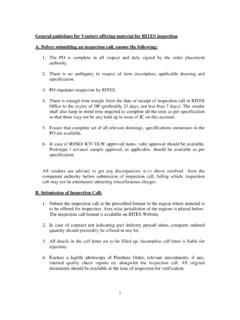Transcription of ABSTRACT SUBMISSION GUIDELINES 12 -15 June 2018 Step- …
1 5th SA TB CONFERENCE ABSTRACT SUBMISSION GUIDELINES . ABSTRACT SUBMISSION GUIDELINES . You are invited to submit an ABSTRACT for consideration by the Scientific Programme Committee for participation at the 5th SA TB Conference programme. The conference is scheduled to place at the Durban International Convention Centre from 12 -15 June 2018. The theme of the conference is Step- Up! Let's Embrace All to End TB! Abstracts will be reviewed according to the following tracks: Track 1: Basic and Clinical Sciences In the last few years progress in global TB control has made serious strides towards elimination, fast tracked by the launch of the rapid diagnostic test for detection of TB and rifampicin-resistant TB (Xpert MTB/RIF assay) and better and more effective TB drugs especially in the field of drug resistance Tuberculosis. This track will focus on improving and expanding the understanding of basic sciences issues, the understanding and advancement of the knowledge base on mechanisms of TB infection and disease, host-pathogen interaction, immunology, genetics, biomarkers, particularly through advances in genomics and molecular biology.
2 In the Clinical Sciences field this track will focus on implementation issues, controlled clinical trials, best practices, clinical case studies and innovative approaches to disease management. Track 2: Public Health and Prevention Strategies Over the past few years, the introduction of new diagnostics and drugs to combat TB have left many feeling that the mantra of Better Drugs, Faster Diagnostics will solve South Africa's TB problem. Yet, while better drugs and faster diagnostics are of great importance, time and again, we quickly realize that basic public health and prevention programs are key to decreasing the burden of disease, including TB, in our communities. When properly implemented, infection control in health facilities, active case finding, targeted screening and prevention programmes for high-risk populations, household contact investigations, community DOTS, and health promotion to increase the demand for TB prevention, diagnosis and treatment services contribute substantially to decreasing the transmission and burden of TB.
3 Unfortunately, public health and prevention programmes are typically and again, underfunded, both in South Africa and globally, compared to the implementation of new drugs and diagnostic tools. This track will highlight and celebrate evidence-based approaches, best-practice models, epidemiological research and implementation science studies aimed at public health and prevention programmes for TB. Track 3: Health Systems, Monitoring and Evaluation Tracking progress towards elimination is a vital component of epidemic control, especially as we strive to end TB. The strengthening of systems, both digital and other, to collect, store and analyse small and large volumes of disaggregated data, the effective utilisation of resources to document and disseminate information and act on analysed data is the cornerstone of any effective disease control programme.
4 This track will focus on health systems, recording and reporting best practices, evaluation of the impact of interventions to allow for programme adjustments where needed, data analytics, new and novel approaches to data collection, storage and analytics, TB surveillance and the application of this in the field at facility, district, provincial and national level. Track 4: Access: Human Rights, Stigma, Marginalised Populations Despite the progress made in addressing challenges faced by marginalized and vulnerable populations, stigma still plays a significant role in impeding access to universal access, treatment and care for both Tuberculosis and HIV services. Respect for human rights is a non-negotiable principle of the South African National Strategic Plan for HIV, Tuberculosis (TB) and sexually transmitted infections (STIs).
5 Goal 3 of the NSP emphasizes the need to reach all key and vulnerable populations with customized and targeted interventions to ensure that nobody is left behind. Marginalized populations include people in detention, migrant workers, people that are the victims of social injustices, people living in informal settlements, experiencing gender discrimination, substance abusers and all persons who do not have equal access to care and treatment. This track will focus on the importance of community based activities, civil society mobilization and advocacy to address social and human rights issues hampering access to universal care and treatment for TB and HIV services. Abstracts can only be submitted electronically through the SA TB Conference website. Abstracts submitted to the conference secretariat directly through any other means will not be accepted for review.
6 Please draft your ABSTRACT according to the headings listed below in no more than 300 words in total. You may draft your ABSTRACT in text format only using a word processing software MS. Word and then copy and paste the text in the ABSTRACT SUBMISSION box. Note that no graphic images, tables, graphs or columns should be submitted with your ABSTRACT . Deadline for ABSTRACT SUBMISSION is 31 January 2018. _____. GUIDELINES for ABSTRACT submissions The on-line ABSTRACT SUBMISSION system is user friendly. You will be guided through the SUBMISSION procedure. Please follow the instructions as shown on the webpage. The submitted ABSTRACT should contain the following information: 1. Background and Objectives 2. Method 3. Results 4. Conclusion ABSTRACT SUBMISSION Information TIP: Draft your ABSTRACT in text format in MS Word or a similar programme according to the fields described in Step 3 below.
7 Please only use Arial plain font in 10 point. Save it as a document once you are sure the content is ready for SUBMISSION as an ABSTRACT . Copy and paste the text from this document into the field provided under Step 2 of the SUBMISSION process. Step 1: ABSTRACT Details You will be required to complete the following fields: Track SUBMISSION type Was the same or similar talk given in SA or abroad ABSTRACT title Authors Author's Mobile Number Author's Work Number Short bio of author E-mail address for nominated author (for reader queries and correspondence). ABSTRACT Text as per the GUIDELINES below Step 2: SUBMISSION of ABSTRACT Content Abstracts that report research findings should contain the following concise statements: Background: The description of the problem or the hypothesis, the study objectives Methods: Study methods used or approaches taken Results: Specific results in summarized form Conclusions: Statement about the main outcomes.
8 Abstracts for reporting on strategies / projects should contain the following concise statements: Back ground: Short statement summarizing the issue(s) addressed by the ABSTRACT Methods A brief description of the project, experience, program, or research Results: A brief description of the results or lessons learned Conclusions: A brief statement of next steps / recommendation The following fields will need to be completed under their respective headings: ABSTRACT Information ABSTRACT Title Has the material presented in this ABSTRACT been published previously? Preferred presentation: (poster or oral presentation). Preferred track Project Scalability: To scale the described project/activity described to a district /regional/national level, what are the requirements? (new or amended policies, operations, human resources, and financial implications).
9 Combined text in these fields should not exceed 300 words. Abstracts can only be submitted in text format no images or graphs should be included. Step 3: Verification of information provided in steps 1 2. All the details that have been provided in the ABSTRACT SUBMISSION process will be presented for verification.





